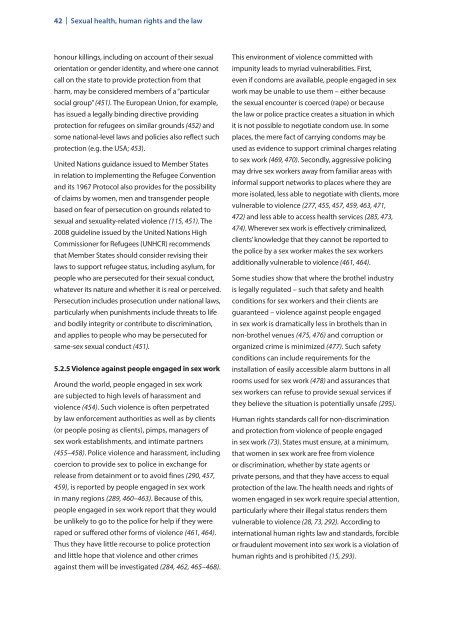Sexual health human rights and the law
1XoaDvM
1XoaDvM
Create successful ePaper yourself
Turn your PDF publications into a flip-book with our unique Google optimized e-Paper software.
42 | <strong>Sexual</strong> <strong>health</strong>, <strong>human</strong> <strong>rights</strong> <strong>and</strong> <strong>the</strong> <strong>law</strong><br />
honour killings, including on account of <strong>the</strong>ir sexual<br />
orientation or gender identity, <strong>and</strong> where one cannot<br />
call on <strong>the</strong> state to provide protection from that<br />
harm, may be considered members of a “particular<br />
social group” (451). The European Union, for example,<br />
has issued a legally binding directive providing<br />
protection for refugees on similar grounds (452) <strong>and</strong><br />
some national-level <strong>law</strong>s <strong>and</strong> policies also reflect such<br />
protection (e.g. <strong>the</strong> USA; 453).<br />
United Nations guidance issued to Member States<br />
in relation to implementing <strong>the</strong> Refugee Convention<br />
<strong>and</strong> its 1967 Protocol also provides for <strong>the</strong> possibility<br />
of claims by women, men <strong>and</strong> transgender people<br />
based on fear of persecution on grounds related to<br />
sexual <strong>and</strong> sexuality-related violence (115, 451). The<br />
2008 guideline issued by <strong>the</strong> United Nations High<br />
Commissioner for Refugees (UNHCR) recommends<br />
that Member States should consider revising <strong>the</strong>ir<br />
<strong>law</strong>s to support refugee status, including asylum, for<br />
people who are persecuted for <strong>the</strong>ir sexual conduct,<br />
whatever its nature <strong>and</strong> whe<strong>the</strong>r it is real or perceived.<br />
Persecution includes prosecution under national <strong>law</strong>s,<br />
particularly when punishments include threats to life<br />
<strong>and</strong> bodily integrity or contribute to discrimination,<br />
<strong>and</strong> applies to people who may be persecuted for<br />
same-sex sexual conduct (451).<br />
5.2.5 Violence against people engaged in sex work<br />
Around <strong>the</strong> world, people engaged in sex work<br />
are subjected to high levels of harassment <strong>and</strong><br />
violence (454). Such violence is often perpetrated<br />
by <strong>law</strong> enforcement authorities as well as by clients<br />
(or people posing as clients), pimps, managers of<br />
sex work establishments, <strong>and</strong> intimate partners<br />
(455–458). Police violence <strong>and</strong> harassment, including<br />
coercion to provide sex to police in exchange for<br />
release from detainment or to avoid fines (290, 457,<br />
459), is reported by people engaged in sex work<br />
in many regions (289, 460–463). Because of this,<br />
people engaged in sex work report that <strong>the</strong>y would<br />
be unlikely to go to <strong>the</strong> police for help if <strong>the</strong>y were<br />
raped or suffered o<strong>the</strong>r forms of violence (461, 464).<br />
Thus <strong>the</strong>y have little recourse to police protection<br />
<strong>and</strong> little hope that violence <strong>and</strong> o<strong>the</strong>r crimes<br />
against <strong>the</strong>m will be investigated (284, 462, 465–468).<br />
This environment of violence committed with<br />
impunity leads to myriad vulnerabilities. First,<br />
even if condoms are available, people engaged in sex<br />
work may be unable to use <strong>the</strong>m – ei<strong>the</strong>r because<br />
<strong>the</strong> sexual encounter is coerced (rape) or because<br />
<strong>the</strong> <strong>law</strong> or police practice creates a situation in which<br />
it is not possible to negotiate condom use. In some<br />
places, <strong>the</strong> mere fact of carrying condoms may be<br />
used as evidence to support criminal charges relating<br />
to sex work (469, 470). Secondly, aggressive policing<br />
may drive sex workers away from familiar areas with<br />
informal support networks to places where <strong>the</strong>y are<br />
more isolated, less able to negotiate with clients, more<br />
vulnerable to violence (277, 455, 457, 459, 463, 471,<br />
472) <strong>and</strong> less able to access <strong>health</strong> services (285, 473,<br />
474). Wherever sex work is effectively criminalized,<br />
clients’ knowledge that <strong>the</strong>y cannot be reported to<br />
<strong>the</strong> police by a sex worker makes <strong>the</strong> sex workers<br />
additionally vulnerable to violence (461, 464).<br />
Some studies show that where <strong>the</strong> bro<strong>the</strong>l industry<br />
is legally regulated – such that safety <strong>and</strong> <strong>health</strong><br />
conditions for sex workers <strong>and</strong> <strong>the</strong>ir clients are<br />
guaranteed – violence against people engaged<br />
in sex work is dramatically less in bro<strong>the</strong>ls than in<br />
non-bro<strong>the</strong>l venues (475, 476) <strong>and</strong> corruption or<br />
organized crime is minimized (477). Such safety<br />
conditions can include requirements for <strong>the</strong><br />
installation of easily accessible alarm buttons in all<br />
rooms used for sex work (478) <strong>and</strong> assurances that<br />
sex workers can refuse to provide sexual services if<br />
<strong>the</strong>y believe <strong>the</strong> situation is potentially unsafe (295).<br />
Human <strong>rights</strong> st<strong>and</strong>ards call for non-discrimination<br />
<strong>and</strong> protection from violence of people engaged<br />
in sex work (73). States must ensure, at a minimum,<br />
that women in sex work are free from violence<br />
or discrimination, whe<strong>the</strong>r by state agents or<br />
private persons, <strong>and</strong> that <strong>the</strong>y have access to equal<br />
protection of <strong>the</strong> <strong>law</strong>. The <strong>health</strong> needs <strong>and</strong> <strong>rights</strong> of<br />
women engaged in sex work require special attention,<br />
particularly where <strong>the</strong>ir illegal status renders <strong>the</strong>m<br />
vulnerable to violence (28, 73, 292). According to<br />
international <strong>human</strong> <strong>rights</strong> <strong>law</strong> <strong>and</strong> st<strong>and</strong>ards, forcible<br />
or fraudulent movement into sex work is a violation of<br />
<strong>human</strong> <strong>rights</strong> <strong>and</strong> is prohibited (15, 293).


